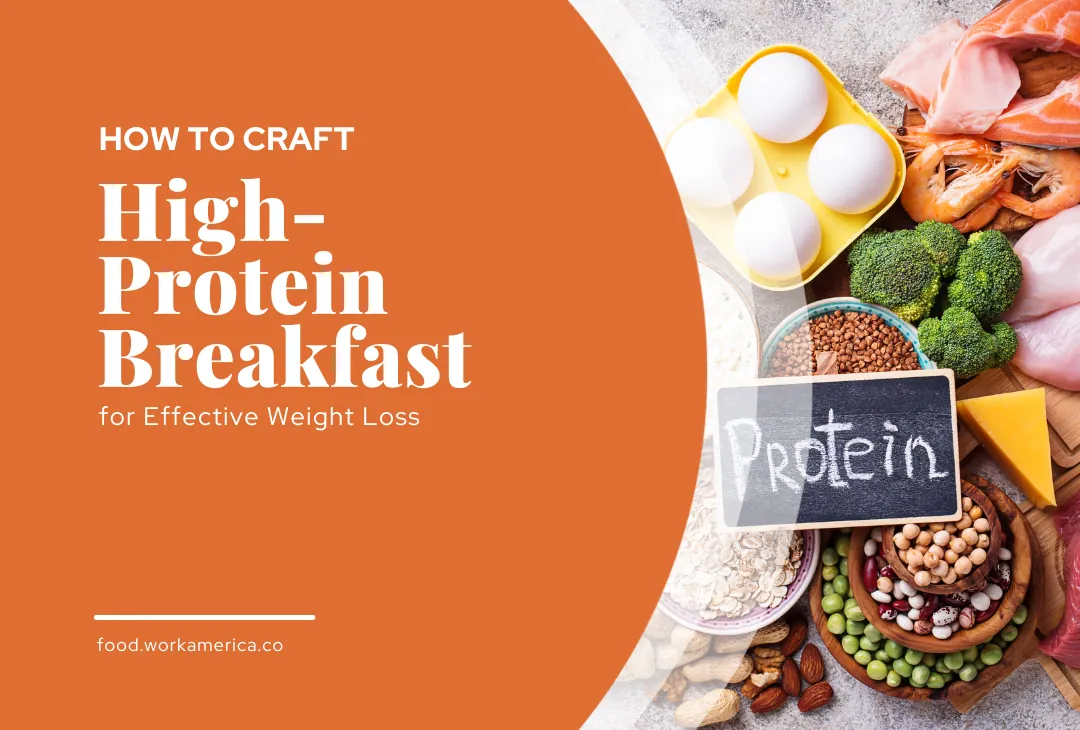The Importance of a High-Protein Breakfast for Weight Loss
In the pursuit of shedding unwanted pounds, one of the most effective strategies often overlooked is starting the day with a high-protein breakfast. This simple yet powerful tweak to your morning routine can kickstart your metabolism, regulate your appetite, and help you achieve your weight loss goals more effectively.
[toc]
Why Is a Healthy Breakfast Important?
The morning meal, commonly known as breakfast, holds significant importance as it breaks the overnight fasting period. Yes, this holds true even if you don’t intentionally practice intermittent fasting or indulge in late-night snacks, as our bodies naturally fast during sleep.
Consuming breakfast enables your body to replenish its blood glucose reserves, the primary source of energy, while also delivering essential vitamins and minerals necessary for optimal functioning.
Starting your day with a wholesome, nutrient-rich, and protein-packed meal may offer a multitude of advantages, including aiding in weight management, reducing risks associated with heart health and metabolism, and enhancing cognitive abilities.
Extensive research has consistently emphasized the significance of maintaining a balanced, protein-rich breakfast to regulate overall nutrient intake. It highlights that individuals who prioritize breakfast tend to make healthier food choices throughout the day, ultimately enhancing their overall dietary quality.
By having breakfast, you signal to your body that a steady influx of calories will be available during the day. Conversely, skipping breakfast sends a signal to your body to conserve calories.
Understanding the Impact of Protein Intake on Weight Loss
Research has demonstrated that protein-rich meals have a profound impact on weight management. By opting for a high-protein breakfast, you’re providing your body with the necessary fuel to maintain muscle mass while promoting fat loss. Moreover, protein has the remarkable ability to keep you feeling fuller for longer, reducing the likelihood of succumbing to unhealthy snacking habits later in the day.
What Breakfast is Best For Weight Loss?
With all this being said, breakfast is clearly an important meal, but it is not simply “eating breakfast” that will make all the difference.
The quality of food and the breakdown of macronutrients are extremely important. Breakfasts that are high in protein and dense in nutrients will allow you to:
- Stay fuller longer
- Prevent unwanted snacking
- Support balanced blood sugar levels
- Protect your lean muscle mass
Additionally, protein is the least likely of all the macros to be stored as body fat when you overdo it.
But not all proteins are created equal. When looking at animal sources like meat, dairy, and fish, leaner options tend to provide excellent nutrition with less saturated fat and calories, making them a great choice for an energy-controlled diet.
The amount of protein you should aim for will vary from person to person based on your unique needs, especially if you are building muscle.
For weight loss and general health, clinical nutrition recommendations suggest a protein intake of 1 gram of protein per kilogram of body weight. This would equal roughly a minimum of 68 grams of protein a day for a 150-pound adult, and when we split that up into 3 meals that’s around 23 grams of protein per meal.
Another way to consider protein needs is by looking at macro balance. The US Dietary Guidelines suggest protein intake should make up 10% to 35% of your daily calories. And on a 2,000-calorie diet, this will equal 50 to 175 grams of protein a day—quite a large range!
For the most part, we could consider a high-protein breakfast to contain as much as 15 grams of protein to over 30!
Not sure how much protein you should be taking in each day to lose weight? This protein calculator factors it for you. Just plug in a few details and get your perfect daily protein needs.
When it comes to crafting the perfect healthy high-protein breakfast, you can always keep it simple and stick to some scrambled eggs with vegetables and a piece of toast. But let’s be honest, it gets boring eating the same thing every day.
Crafting the Perfect High-Protein Breakfast
- Incorporate Lean Protein Sources
Choose lean protein sources such as eggs, Greek yogurt, or cottage cheese as the cornerstone of your morning meal. These options are not only rich in protein but also contain essential nutrients vital for overall well-being. - Integrate Fiber-Rich Foods
Boost the satiety factor by incorporating fiber-rich foods like whole grains, nuts, and seeds. These elements not only complement the protein content but also aid in maintaining digestive health and regulating blood sugar levels. - Embrace Nutrient-Dense Ingredients
By including nutrient-dense fruits and vegetables in your breakfast, you ensure your body receives a plethora of vitamins, minerals, and antioxidants crucial for enhancing overall health and well-being.
Final Thoughts
Elevating your breakfast game with a focus on high-protein options can set the stage for a successful weight loss journey. With the right balance of nutrients and a strategic approach to meal planning, you can not only achieve your desired weight but also foster a healthier lifestyle overall.
Incorporate these simple yet effective strategies into your daily routine, and witness the transformative power of a high-protein breakfast in your pursuit of a healthier, fitter you.
Take the First Step Towards Your Weight Loss Goals Today!

